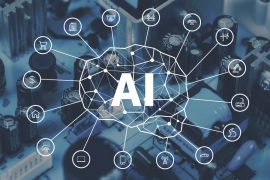Future Proofing with AI

Where is AI?
AI has gained traction across various industries and is pervasive in our day-to-day lives. In healthcare for instance, AI executes diagnosis analysis, robotic surgeries, drug discovery and more, giving new meaning to “modern healthcare.” In logistics, AI-powered robots package and sort products, helping suppliers manage inventories. In the automotive industry, self-driving cars such as Tesla’s suggest AI might replace manual driving in the future. AI-enabled chatbots provide a new way to enhance customer experiences across the travel, real-estate, and retail industries. In gaming, non-playing characters exhibit more responsive and adaptive behaviour when powered by AI. These innovations are just the beginning.
AI hits closer to home too. When you’re on your phone, it’s likely you’re interacting with AI — from built-in smart assistant tools, facial recognition, and virtual reality animation. AI is behind much of what we see on social media too. Feeds on our timelines, notifications and ads are all curated by AI.
On top of this, AI monitors online behaviors and personalizes online shopping experiences. For example, Netflix, Spotify and YouTube use AI to generate recommendations based on past choices. The same happens when you buy a particular type of product. An AI recommendation engine will suggest similar items based on your past purchase.

AI plays a role in how we communicate and get information too. Google’s feature “smart compose” scans text and suggests possible responses. Similarly, Google’s predictive searches connect content to users’ queries. These autocomplete predictions make completing searches faster.
From data to intelligence
AI is a processor that needs to be fed good data to get the results that assist in decision making and value generation. It is data that drives AI, paired with algorithms and processing.
Most organizations have an abundance of data though only a few use it successfully. With AI, organizations can integrate existing data, produce algorithms and discover unique data patterns that create value for customers and enhance performance. Value generation becomes achievable when processing is done with the right data and algorithms. Furthermore, AI organizes bulk data. It learns and detects flaws to generate useful information. Take Walmart for example. To streamline the restocking process, Walmart uses AI robots that capture data from empty shelves.
As Ginni Rometty, Former CEO of IBM, said, “All processes can be made better through AI.” However, businesses need to first take stock of where they are in their transformation journey and which element of AI could add the most value to their bottom line. After this, businesses must assess cost and return on investment in AI for their specific needs. Finally, they must understand how to put together a team to aid them in their journey.
Exceptional customer service and personalization are standards that need to be continuously met in today’s uber-competitive market. AI is key to delivering on this promise. Companies such as Amazon adopt AI-based strategies that assist in providing customized recommendations, enabling them to achieve increased customer loyalty and reputation.
AI is strengthening every industry and affecting our daily lives more than ever. Thus, it is only plausible to pull up our socks and take the changes head on for a smarter today and tomorrow.
To learn more about how we are assisting enterprises in their AI journey, do visit https://fusemachines.com/ai-education/#ai-for-enterprises


